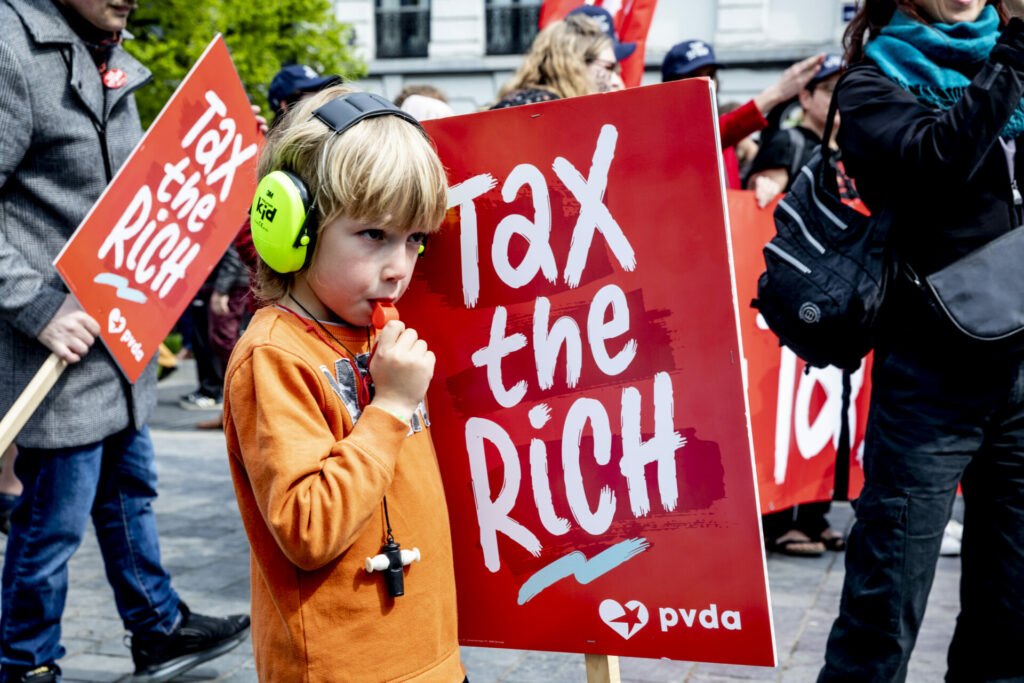Various political parties – from the radical left Worker's Party to the liberals and the Flemish far-right Vlaams Belang – used Labour Day on Monday to take a policy stance ahead of the Federal elections next year.
On 1 May, the country historically commemorates the historic struggles and gains made by workers. The day was marked by festivities and a total of three demonstrations in Brussels, as well as speeches by the various political parties about the current labour policy and how this might be modified.
In his 1 May message in Brussels, leader of the Worker's Party (PVDA/PTB) Raoul Hedebouw again called for a millionaire's tax, and marketed his party as "a true left alternative" to "build a bulwark against the far-right and against liberal policies."
At the same time, Hedebouw also lashed out at the Flemish and Francophone socialist parties Vooruit and PS, respectively. The leader of Vooruit, Conner Rousseau, last week launched a proposal to offer long-term jobseekers compulsory basic employment after two years – which Hedebouw described as "punishing the unemployed instead of going after the super-rich."
'Not in the coalition agreement'
Socialist Party (PS) chair Paul Magnette also came out against limiting unemployment to a set timeframe, after Prime Minister Alexander De Croo had lauded Rousseau's proposal. "When you are Prime Minister, you do not pit workers against the unemployed. You put yourself above the fray. This point is not in the coalition agreement, so we will not talk about it."
The fact that Rousseau's proposal was not well-received also became evident at the Brussels' PS celebration: "The obsession with pointing the finger at the long-term unemployed by only proposing a compulsory job, sanction or exclusion to them is cynical," said Brussels parliamentary leader Ahmed Laaouej.
But Flemish and Francophone liberal parties Open VLD and MR put on a common front on the matter of limiting unemployment benefits to a maximum of two years. Both parties affirmed that they will put this on the agenda of the Federal Government.
"We are the only ones who have linked tax reform to labour market reform," MR President Georges-Louis Bouchez said at Tour and Taxis in Brussels. "If we want to cut taxes, more people have to work. We also need to reform the labour market and unemployment."
Related News
- Belgian politics for dummies: Who is in power where?
- 2024 elections: Belgium must not 'be held hostage again' by regional differences, says De Croo
Bouchez recalled that Belgium is in the top five European countries with the lowest employment rate. "At the same time, we are world champions in paying taxes." The francophone liberal accused PS of holding up the labour market reform: "PS is behaving as the Greens do with nuclear energy – they know what to do, but they are not doing it for dogmatic or electoral reasons."
Open VLD president Egbert Lachaert attended the MR meeting and said the liberals will "put the limitation [of unemployment benefits] to two years on the government's table," adding that the idea is gaining support in Flanders.
"We should not wait for the elections," Bouchez stressed. "Everything we can do right now, we should do, for the sake of our country and its bicentenary in 2030."
'Belgium living beyond its means'
Meanwhile Tom Van Grieken, chair of far-right Vlaams Belang, launched a proposal to increase the net pay of so-called "ordinary" Flemish people. "The tax-free allowance should be raised to the level of the living wage and the second tax bracket should go from 40% to 30%. That will quickly give working Flemish people €150 more net per month."
"In such a prosperous country as Flanders, such a thing as working poor can exist," Van Grieken said. "It is not normal that people who have full-time jobs have to work extra after hours just to make ends meet or have to queue at the food bank."
Vlaams Belang therefore proposes lowering taxes to assist those who are struggling: "Does this measure cost money? Sure. But it is not the Flemish person who lives beyond his means, it is the Belgian state that lives beyond its means!" The divisive comments echoed those of Flemish Minister-President (of right party N-VA), who earlier in the day highlighted the relative economic wellbeing of Flanders compared to Brussels and Wallonia.

